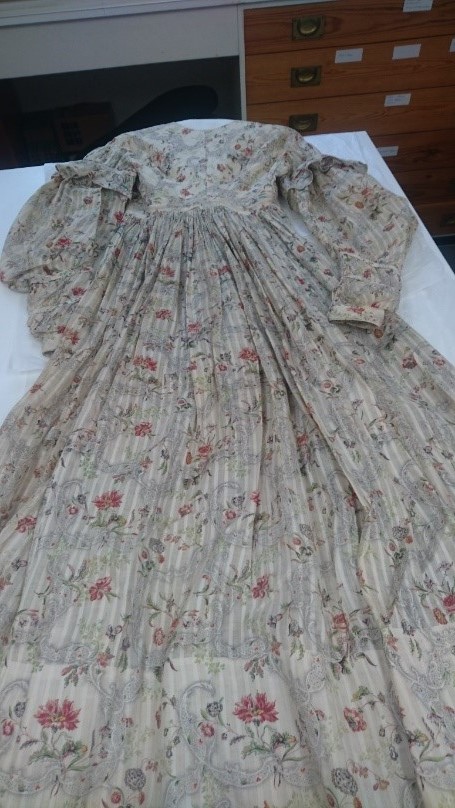- youtube
- bluesky
- Home
- About
- Costume Journal
- Membership
- Conference & Events
- Grants & Awards
- News & Social
Report by the winner of the Yarwood Award, 2017
Bio
Katie Godman studied MA Fashion Cultures: History and Culture at London College of Fashion, University of the Arts London. She is a Costume Librarian for Islington Education Library Service. Her paper, The Importance of Fashion History in the Implementation of Colonialism: A Case Study of Nineteenth Century British Fashion Plates featured at Interwoven: Dress that Crosses Borders and Challenges Boundaries, the annual International Conference of Dress Historians. Her areas of interest are the eighteenth and nineteenth centuries. She has a BA in Creative Writing from the University of Leeds and her novels are represented by the John Jarrold Agency.
Katie Godman: Yarwood Report
My MA project, ‘From the Neo-Classical to the Romantic 1800 to 1830: An Investigation into the Influences for this Stylist Shift’ focused on the dramatic changes in women’s dress during the early nineteenth century. I was drawn to this era due to the striking, liberated silhouettes of the empire line gowns which contrast to the restrictive Romantic fashions which come after.
Much of my preliminary research described the Neo-Classical fashions as liberating, not just in style, but also in a social sense as they were supposedly worn by all classes due to their simplicity. This seemed to be down to the many social and economic changes that were taking place during this period which facilitated the rise of the middle class. This period of class mobility was very interesting to me, and I thought that primary research would be required to assess the shape, feel and durability of the dresses to see if they were as classless as they seemed.
I ended up focusing on smaller collections outside of London, partly as I thought they would have more garments owned by the middle-classes and also as I thought they might have been subject to less research. The archives I decided to visit were Blaise Castle Museum (Bristol), The Fashion Museum (Bath), The Bowes Museum (Bernard Castle), Brighton Museum and Art Gallery, The Gallery of Costume (Manchester), Chertsey Museum and Worthing Museum and Art Gallery. These sites were also interesting as they were spread around the country and part of my initial research detailed fashion speeding up during this period in different areas, which could have been a reason for the dramatic shift in styles. Examining how quickly fashion changed outside of London could also point to issues of class. The archives had a wide range of garments from the period and proved to be a treasure trove of information. Handling such a selection of pieces really helped me to gain an insight into the fashion of the era by seeing the the cut and feel of the clothes, as well as the how the gradual changes in style could reflect an increasing public obsession with morality and preserving class structures as the century progressed.
I found that many of the changes in fashion were gradual and subtle, and also that fashion was changing at a fast rate. On the surface the shift seems abrupt but up close the shift was happened gradually. Handling the gowns and seeing how they would have been constructed and worn also raised questions about whether they really were classless after all, as the pale fabric, apron fronts and trains were more suited to a romanticised peasant than a real life hard working-class woman. However it was interesting to see that in the 1810s the arrival of back fastening dresses brought added practicality, which coincided with the decorations on the gowns became more ornate, re-enforcing the wealth of the wearer. This primary research proved a vital element of my work and helped me focus on issues of class.
I would like to thank Costume Society for the grant, which helped fund the research and enabled me to research Regency dress throughout the country.
Image gallery
(Part of the Olive Matthews collection) Example of an apron front dress

(Part of the Olive Matthews collection) Example of an apron front dress
Example of a Romantic style gown

Example of a Romantic style gown